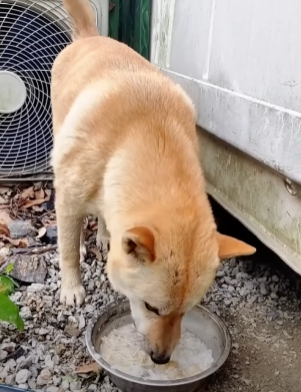
The morning was quiet, the kind of stillness that comes after a night of heavy rain. Puddles dotted the road, reflecting the pale light of dawn. I had just stepped out of my car to deliver food to the stray dogs that lingered near the old railway station when I saw her—thin, trembling, and soaked to the bone.
She stood a few yards away, half-hidden behind a pile of discarded boxes. Her fur was muddy, her ribs visible, and her eyes—dark, desperate, and full of emotion—locked onto mine. She didn’t bark or growl. She just stared, as if trying to tell me something.
“Hey there, girl,” I said softly, reaching into the food bag. “You hungry?”
When I tossed a piece of bread toward her, she didn’t rush for it. Instead, she took a cautious step forward, sniffed the air, and then looked up at me again. Her tail wagged slightly, but her body language was restless. It was clear she wasn’t just looking for food. She was trying to communicate.
I crouched down slowly, speaking in a calm tone. “It’s okay. I won’t hurt you.”
She took another step closer, then turned her head and looked toward the far side of the alley. Then she looked back at me and whined—a short, pleading sound that pierced straight through my heart.
It was then I realized: she wanted me to follow her.
“Do you want me to come with you?” I asked gently.
Her ears twitched. She turned and began walking, slowly at first, glancing back every few seconds to make sure I was following. I grabbed a few pieces of bread and some dry dog food, then followed her through the narrow alleyway. The path was littered with old cans and broken bottles, but she moved with surprising purpose.
After a few minutes, she led me behind an abandoned building, where tall grass and trash piles made a small hidden corner. She stopped near a broken wooden crate and let out a soft whimper.
Then I heard it—a faint, high-pitched squeaking sound.
My heart jumped. I knelt down and gently peered into the crate.
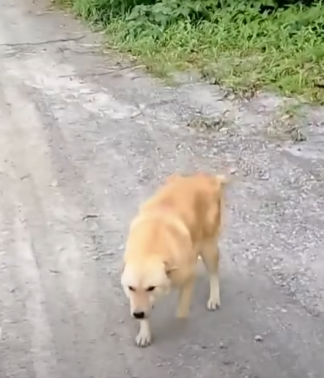
Inside, huddled together on a damp piece of cloth, were five tiny puppies. Their eyes were barely open, their small bodies shivering. The mother stepped closer, her nose brushing each one as if to introduce them. Then she looked up at me again, whining softly, her eyes pleading: Please help them.
I swallowed hard, tears stinging my eyes. “Oh, sweetheart… you brought me to your babies.”
The mother dog’s body was frail; she was starving, yet her first instinct wasn’t to eat—it was to protect and save her litter. Her ribs rose and fell quickly as she hovered over them, her tail low, her eyes flicking between me and her pups.
I placed a bit of food in front of her and stepped back to give her space. She hesitated only for a moment before devouring it, desperate and hungry. But even as she ate, she kept glancing at her puppies, never fully relaxing.
It was clear she had been surviving only for them.
I spoke softly. “I’m going to help you. I promise.”
The next step was to get them out of there safely. I called my friend Mia, who volunteered at an animal rescue center nearby. Within twenty minutes, she arrived with a crate, blankets, and some milk replacer for the puppies.
When Mia saw the scene, she gasped. “Oh my goodness. She actually brought you here?”
I nodded. “She led me straight to them. It’s like she knew.”
Together, we began preparing to move the little family. But the mother grew anxious as we reached for her puppies. She stood in front of them protectively, growling softly—not out of aggression, but fear.
Mia knelt down and whispered, “It’s okay, mama. We’re helping you.”
Then she offered her hand, palm down, letting the mother sniff her. After a few tense moments, the dog’s body relaxed. She seemed to understand. She stepped aside, watching closely as we gently lifted the puppies into the crate.
When the last one was safely inside, she climbed in after them, curling her body protectively around their tiny forms. Her eyes met mine again, and for the first time, I saw a glimmer of relief.
Back at the shelter, the team immediately went to work. The mother was given warm food, clean water, and a quiet space to rest. The vet examined her carefully—she was malnourished, dehydrated, and covered in small wounds from weeks of surviving on the streets. But her spirit remained strong.
They named her Hope.
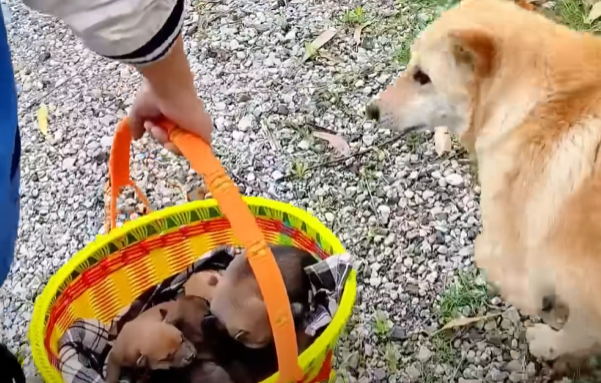
Her five puppies were tiny but healthy enough to nurse once their mother began recovering. The staff bottle-fed them until Hope’s milk supply returned. Every day, she grew stronger. She would wag her tail shyly whenever we entered her room, her eyes full of gratitude.
I visited her daily. She always greeted me with soft whines and gentle licks, as if she remembered that I had followed her that morning—the moment that changed her life.
Over the next few weeks, the transformation was nothing short of miraculous. Hope’s fur began to shine again, her ribs slowly disappeared beneath healthy muscle, and her puppies grew chubby and playful.
They named the puppies after virtues—Faith, Joy, Brave, Lucky, and Peace. Each had their own personality: Faith was the curious explorer, Joy loved to tumble around her siblings, Brave tried to bark even though his voice squeaked, Lucky always fell asleep in his food bowl, and little Peace was the quiet one who stayed close to Hope’s side.
The shelter staff adored them, but it was clear that Hope was the heart of the room. She watched over her babies constantly, licking them clean, gently correcting them when they got too rough, and resting only when they did.
Sometimes, I would sit beside her, stroking her fur. “You’re such a good mom,” I’d whisper. “You knew what to do, didn’t you? You found help.”
She’d close her eyes, sighing deeply, as if finally at peace.
News of Hope and her puppies spread quickly through the shelter’s social media. People were touched by her story—a stray mother who led a stranger to her hidden litter, trusting humans one more time when it mattered most. Donations poured in, along with adoption requests.
After two months, when the puppies were weaned and old enough, families began coming to meet them. Each puppy found a loving home quickly. Watching them leave was bittersweet—Hope would sniff each one before they went, give a soft whine, and then watch them go with calm acceptance. She seemed to know they were safe.
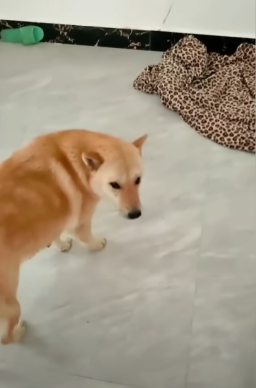
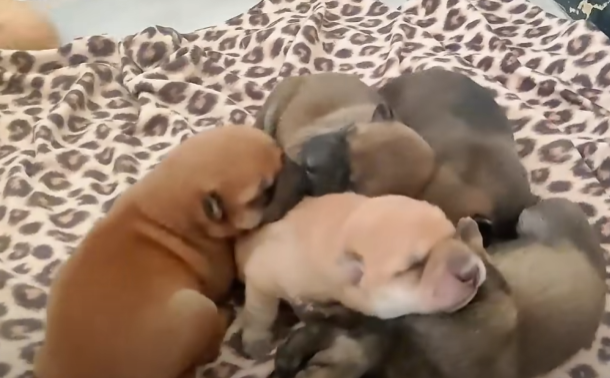
But the best moment came when a family who had seen her story online came to meet her.
The father knelt down and said, “We read about Hope and how brave she is. We want to give her a home.”
I watched as Hope approached them slowly, sniffed their hands, and then leaned in, pressing her head into the woman’s lap. It was her quiet way of saying yes.
That evening, as they loaded her into their car, Hope turned back to look at me. For a moment, our eyes met again—just as they had that first day by the boxes. This time, her eyes were bright, calm, and full of trust.
“Goodbye, Hope,” I whispered. “You did it. You saved your babies—and now it’s your turn to be happy.”
The car drove off, and I stood there for a long time, watching until it disappeared down the road.
Hope’s story stayed with me ever since. She had been a stray, starving, and alone—but when her babies needed her, she found the strength to trust again. She had led me through mud and ruins, not for herself, but for her children.
That day, she didn’t just lead me to her hidden litter. She led me to a lesson I would never forget—that even in the darkest corners of life, love and courage still shine the brightest.


